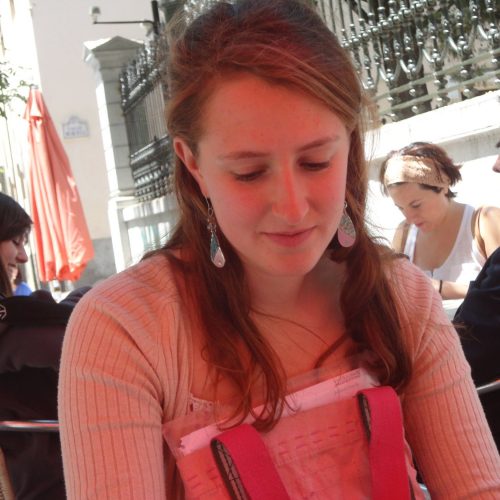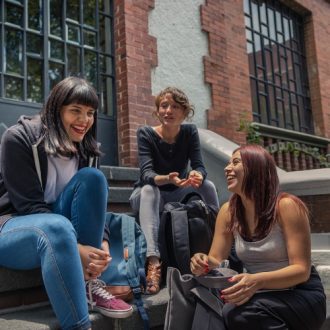
Adapting to a New Culture: Claudia’s Experiences
Dear Micha,
Earlier this week we discussed the adaptation process, but today we want to dive into Claudia’s answers to the different questions that we discussed in this post. We wanted to share our own, personal experiences to highlight two main points. Firstly, no experience is ever going to be exactly the same as any other experience. Secondly, no matter how many times we have traveled or well we do in a place or how much we like it, we still live the adaptation process.
Again, these are the answers to the same questions we proposed in this post.
 Where are you coming from?
Where are you coming from?
Until 18 years old, I was just a typical midwestern girl. I grew up in a small town in Wisconsin, going to public school, getting good grades, and having a reasonable amount of friends. However, my dad is from the city of Seattle and my mum is from the U.K. and I had the opportunity to travel, aka visit family in different places, from a very young age (my parents say my first transatlantic flight was at six months old, back when they still put babies in boxes and sat them on tray tables).
While I relished in the fact that I had a passport and had used it at a young age, I would not have called myself a big traveler. And when my parents decided to move abroad to Spain while I was finishing high school, I refused to go along with them, saying that I wanted to graduate with the rest of my class. The whole idea of finishing high school in Spain freaked me. However, when I turned 18, my parents moved abroad with my little brother and I was left to figure out what I wanted to do with my life. And what I decided was a gap year between finishing high school and starting university.
I took that gap year and it changed my perspective on how I want to live my own life. To this day, I do not consider myself to be a traveler and will only move abroad when the “time feels right” because it feels like such an emotional uprooting for me (for me, moving abroad doesn’t necessarily “get easier” like I talk about in this post). However, I have had plenty of opportunities to adapt to somewhere new.
What are your previous experiences?
Since leaving the U.S. over 10 years ago, I have only been back a handful of times for short periods of time, meaning that I have lived my adult life almost exclusively in countries that are very different to where I grew up. Most of that time has been spent in Spain (I did end up following my parents after all), although I have also spent a significant amount of time in Brazil and Portugal, and now I call Helsinki, Finland home.
As someone who has lived abroad a fair amount, in many different circumstances, I am quite surprised at how different the experiences have been. At the same time, it seems normal. Think about it—in your everyday life, even in your home country, life is always changing. Well, when living abroad, the same thing happens only you are less likely to really understand what is going on around you until you have properly integrated into the community or have a partner/close friend who can explain it to you. How long this takes depends on where you are living, what you are doing there, and who you are interacting with.
 How are you becoming part of the community?
How are you becoming part of the community?
My shortest time living in one place was when I lived in Rio de Janeiro, Brazil for about five months (and I would argue that for a true living abroad experience, you probably want to live somewhere for at least six months). The circumstances were exceptional and I am very lucky to have had such a positive experience integrating into the community around me. However, I don’t know if, looking back, I would say that I was really part of this world or just connected to it through the people I was interacting with.
The longest time I lived in one place was living in Granada, Spain for about three years as I was finishing my bachelor’s, doing a master’s, and working. In this scenario, my level of integration into the community was completely different. Now, this is not to say it was better or worse (or that I enjoyed myself more or less) than the five months I spent in Brazil, but the circumstances were extremely different and, therefore, my role in the community was too. Let’s go back to the three ideas I talked about earlier:
Where you are living?: Personally, for me, I have to say that I am not a city person and living in smaller cities such as Granada, Lisbon, and Helsinki have been much more pleasant experiences than living in Rio de Janeiro. That does not mean that I was not able to make connections and community in Rio (I did and I really enjoyed living there) but I could imagine similar circumstances where I would not have been able to thrive in this massive city. And I know many people who go the other way as well, they love big cities and find cities, even capitals like Helsinki, to be too small for what they are looking for.
Now, in Helsinki, I find myself living in a place that I really enjoy. I live alone but I don’t really feel lonely as I have managed to find enough social activities. I can also walk to work and most places in the downtown area which is a huge bonus. Finally, I live about a 15 minute walk from the beach and just knowing it is there makes me happy.
 What are you doing there?: I’ve done different things in all the places I’ve lived. In Brazil, I mostly just enjoyed life. In Granada, I studied Spanish, studied a degree and a masters, and worked. In Portugal, I did my study abroad. And now, in Helsinki, I am focusing on working.
What are you doing there?: I’ve done different things in all the places I’ve lived. In Brazil, I mostly just enjoyed life. In Granada, I studied Spanish, studied a degree and a masters, and worked. In Portugal, I did my study abroad. And now, in Helsinki, I am focusing on working.
What you are doing in a place really impacts your level of integration in the sense that when I was studying at the language school in Granada, I mostly spoke English outside of class and most of my friends were foreigners. On the other hand, when I started studying my degree, my level of Spanish was already advanced enough that I started making Spanish friends. In addition, in all the places I have lived, if I can interact with locals in their “normal” environments (i.e. school, work, sports, etc.), I find it is easier to make a space for me in their community.
Now I am in Finland, I don’t really need the language to work or make friends. On one hand, it is amazing that everyone speaks such good English and are happy to communicate with me in a language I understand. On the other hand, it makes it really difficult for me to find the motivation and encouragement to learn Fininish, something I would like to do. I feel like learning Finnish will help me better integrate into the community, although I don’t really know until I try.
Who you are interacting with?: For me, I always have friends who are foreigners but I always try to have friends who are from the place I am living as well. I would say that living in Brazil I was the most integrated with local friends and living in Portugal I was the least. Both experiences were amazing but this integration does make a difference in how adapted I felt there.
In addition, I have found that wherever I go, I find that trying to encounter curiosity (if not passion) about the country and city I am living in. In my personal experience, I find that life is more interesting when I am curious but also other people are more interested in your story when you are curious about theirs.
 It is an ongoing process
It is an ongoing process
Reflecting on all of these points, I would say that I have adapted to and stuck it out in most of the places I have mentioned living. I believe that I have been pretty successful at integrating into different ways of life and the communities I have lived in. Notwithstanding, this has always been a difficult process for me and I would not say that I particularly enjoy moving countries or even cities because it is not easy to adapt again to a new place. And when I get frustrated that things are not going as I expected, I always go back to think about what I am personally doing to achieve the results I desire.
At the same time, I feel like there are many phases that we go through, ups and downs, no matter how good the experience is. Even here, in Helsinki, where I am quite happy with my job and my community integration, I feel like sometimes I am going to slow with setting up my life here. There are small milestones, like the first group of people I played soccer with, that have so much importance when you don’t know anyone. Now, one and a half years in, I have three groups plus play Gaelic football with a local club.
That is why one thing I always talk about with people who are feeling frustrated is that you shouldn’t rush yourself. Adapting to a new place, especially when you don’t know anyone or the local language, is one of the most difficult things I have ever done. It is, on the flip side, incredibly rewarding and I love feeling like I am advancing in the process. Just know that you are going to have to invest in the place and in yourself to make it all fit.
Sincerely,
Claudia




